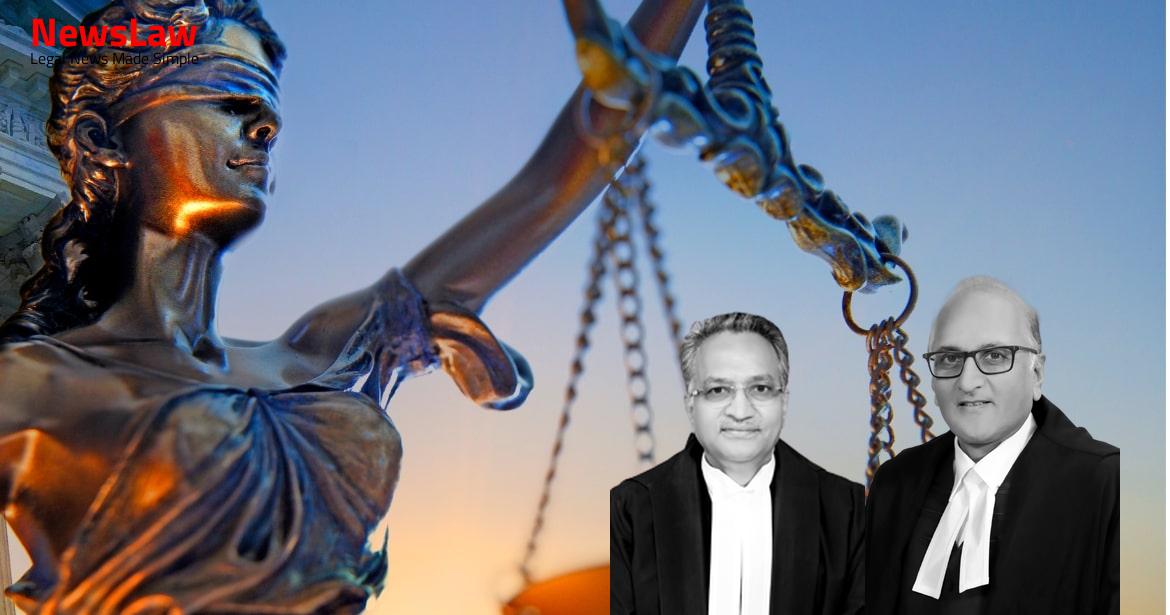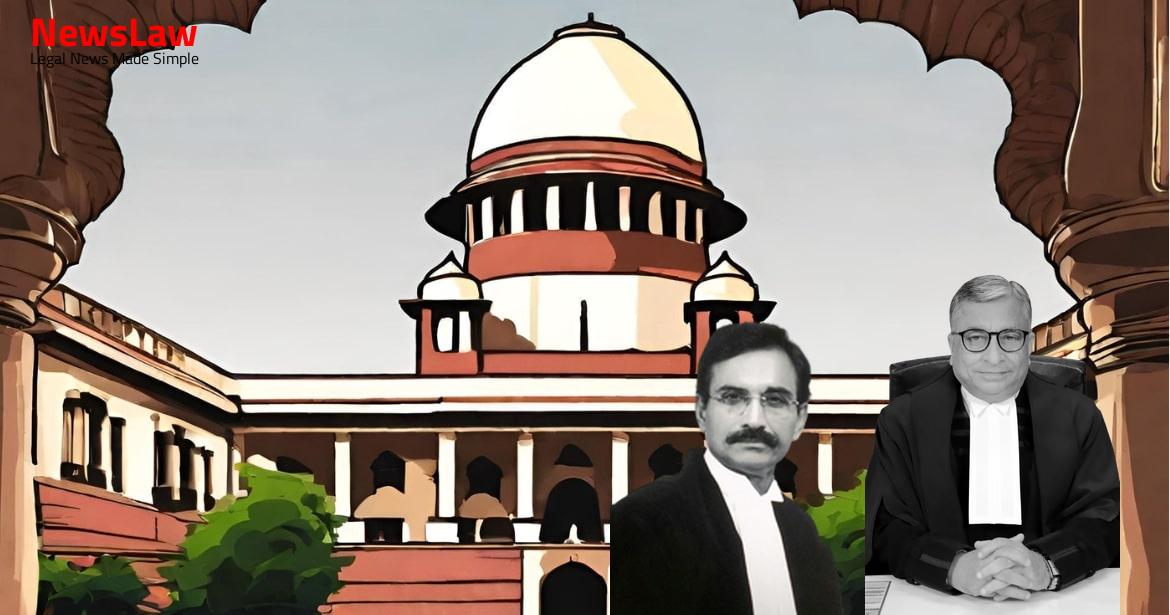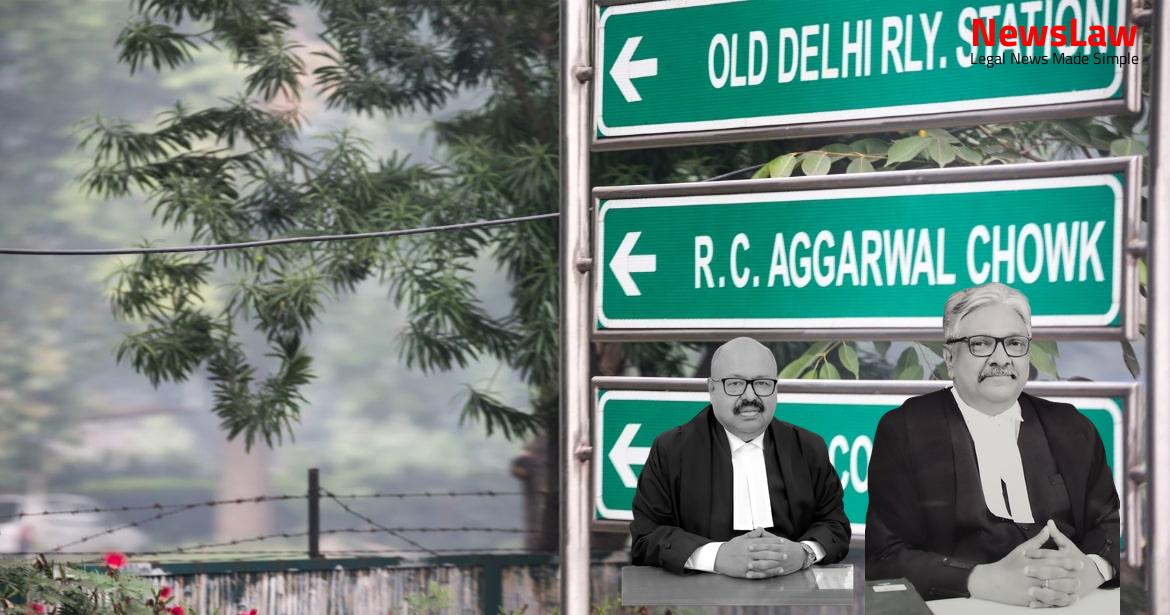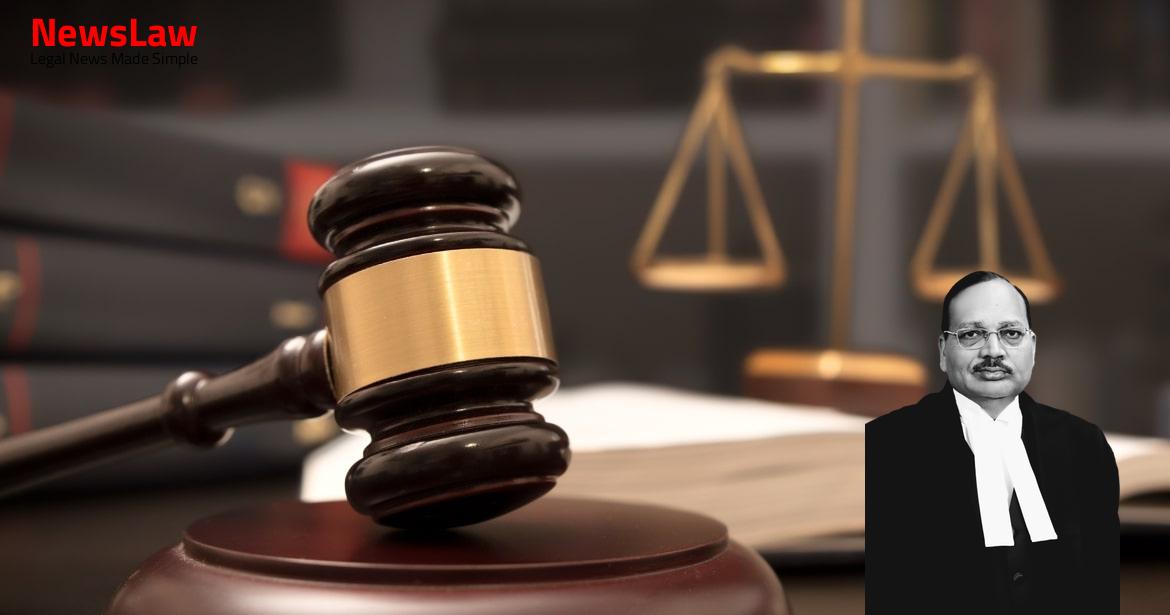The central issue in this case is the delicate balance between judicial restraint and the constitutional powers of the court, particularly regarding limitation periods in statutory appeals. The court’s analysis dives into the core principles of adherence to statutory limitations, availability of alternative remedies, and the exercise of powers under Article 226 of the Constitution of India. Follow along for a closer look at the legal framework guiding such decisions.
Facts
- The High Court passed an ex-parte order on 8.11.2018 after the respondent failed to file an appeal against the assessment order dated 21.6.2017.
- The respondent was advised to file a writ petition solely for quashing the assessment order dated 21.6.2017 and to direct re-assessment based on Form ‘F’.
- The respondent deposited 12.5% of the disputed tax as per the order on 13.11.2018.
- The writ petition was allowed on 19.11.2018, quashing the assessment order and remanding the matter back to the respondent.
- The respondent did not challenge the order passed by the Appellate Deputy Commissioner regarding the assessment order of 2013-2014.
- The respondent, a registered dealer under VAT and CST Acts, failed to file an appeal within the prescribed time, leading to the High Court entertaining the writ petition.
- The High Court noted that the respondent had paid 12.5% of the disputed tax for filing an appeal.
- The appellate authority found no sufficient cause for the delay in filing the appeal, despite the respondent’s employee defaulting and being suspended.
- The respondent was directed to pay an additional 12.5% of the disputed tax within a week by the Division Bench of the High Court.
- The appellate authority issued notices to the appellant to explain reasons for the delay in admission hearings.
- The High Court allowed the writ petition as the statutory remedy became ineffective due to the expiry of 60 days from the assessment order, despite the extraordinary situation caused by the employee’s actions.
Also Read: Land Acquisition Challenges for Integrated Infrastructure Project
Issue
- The central issue in this appeal is whether the High Court should have entertained the writ petition filed by the respondent.
- The High Court has the power to issue directions, orders, or writs under Article 226 of the Constitution of India, but should not do so if an effective alternative remedy is available to the aggrieved person.
- Referring to past cases such as Baburam Prakash Chandra Maheshwari vs Antarim Zila Parishad and Nivedita Sharma vs. Cellular Operators Association of India & Ors, it is emphasized that the High Court must exercise self-imposed restraint and not entertain a writ petition if an alternative effective remedy exists.
- In the case of Thansingh Nathmal & Ors. vs Superintendent of Taxes, Dhubri & Ors., it was clarified by the Constitution Bench that the wide power of the High Court under Article 226 must be balanced by the availability of an alternative remedy for the aggrieved person.
Also Read: Analysis of Legal Issues in Property Dispute Case
Arguments
- The petitioner argues that Mr. P. Sriram Murthy filed an application without informing the company, leading to the delay in filing the appeal.
- The petitioner contends that the service of the assessment order on 22.6.2017 should not prevent the appeal from being filed.
- The petitioner believes that pursuing further appeal to the APVAT Appellate Tribunal would be futile as they may not be able to challenge the delay beyond 30 days.
- The petitioner has lost the appellate remedy due to the passage of time, but cites a previous case where a Writ Petition under Article 226 of the Constitution was allowed even after the appeal period had expired.
- It is mentioned that Mr. P. Sri Ram Murthy remitted an amount online towards the disputed tax, indicating cooperation from the petitioner’s side.
- The High Court’s decision to set aside the assessment order dated 21.6.2017 is questioned, stating that the court may have exceeded its jurisdiction.
- The petitioner expresses difficulties in pursuing the remedy and highlights the need for relief under Article 226 of the Constitution to prevent a failure of justice in this exceptional situation.
- Petitioner filed an appeal with a delay which was not entertained due to condonation period exceeded.
- One of the employees engaged in malpractices leading to disciplinary proceedings by the management.
- Petitioner seeks one opportunity to address the issue.
- Petitioner has already paid 12.5% of disputed tax.
- Request for one more opportunity will be considered if an additional 12.5% of disputed tax is paid.
- Employee, Mr. P. Sriram Murthy, suspended due to irregularities.
- Company unaware of demand raised in CST assessment order for 2013-2014 until after employee’s suspension.
- Employee’s engagement of Chartered Accountant and appeal filing not informed to the company.
- Contention that discrepancies lie in the value reported in CST returns and amount in Form ‘F’ related to turnover.
- Respondent already deposited additional 12.5% of disputed tax amount as per earlier order.
Also Read: Legal Analysis on Levy of Customs Duty on Non-Excisable Goods Sold in Domestic Tariff Area by an EOU
Analysis
- The High Court dismissed the writ petition on the grounds of an adequate alternative remedy being available through an appeal under Section 35 of the Central Excise Act.
- The delay in filing the appeal was beyond the statutory limitation period of 60 days as prescribed under Section 31 of the 2005 Act.
- The respondent challenged the assessment order through a statutory appeal only on 24.9.2018, which was significantly delayed.
- Admittance of the appeal was not feasible as it was filed well beyond the 60 days period specified by Section 31 of the 2005 Act.
- The judicial review of the High Court is limited when an alternative efficacious remedy is available to the aggrieved party.
- The appellate authority is not empowered to condone delay beyond the total 60 days’ period from the date of the order or service of proceedings.
- The appeal was filed after the aggregate 60 days’ period specified in Section 31 of the 2005 Act, making it non-admissible.
- The High Court’s jurisdiction is not curtailed, but it may refuse to entertain a writ petition if an alternative remedy is available to the petitioner.
- The appellant failed to file the appeal petition within the prescribed time under the APVAT Act, 2005.
- The respondent’s causes for delay condonation were not rational and did not align with the facts of the case.
- VAT dealer, TOT dealer, or any other dealer objecting to an order passed by any authority under the Act may appeal within thirty days of being served the order.
- The appeal must include proof of payment of taxes, penalties, interest, or any other admitted amount, along with 12.5% of the disputed amount difference.
- The appeal must be in the prescribed form, verified accordingly, and accompanied by a fee ranging from Rs.50 to Rs.1000.
- The appellate authority, upon admitting an appeal, may grant stay of tax collection balance upon specified conditions or payments from the appellant.
- In case of refusal to grant stay, the appellant can file a revision petition within thirty days to the Additional Commissioner or Joint Commissioner.
- If an appeal is made to the Appellate Tribunal under Section 33, the stay order remains effective until the Tribunal’s decision.
- The appellate authority has the power to confirm, reduce, enhance, annul, or set aside assessments or penalties.
- The period of two years for passing appeal orders can be extended due to stay orders by higher courts or pending proceedings.
- All orders passed in appeal under this section are final and subject to specific provisions mentioned.
- The appellate authority can conduct inquiries, remand cases for further reports, and consider appeals made within thirty days after the initial period with sufficient cause.
- Provision in an ordinary law does not limit the powers of the Apex Court under Article 142(1)
- Statutes providing special remedies for liabilities created by them must be followed exclusively
- Orders made by the Court should be consistent with fundamental rights and statutory provisions
- High Court’s powers under Article 226 are wide but not wider than the Supreme Court’s powers under Article 142
- Limitation prescribed in statutes must be adhered to, and Section 5 of the Limitation Act cannot be invoked to maintain an appeal beyond the prescribed period
- Exercise of jurisdiction under Article 142 must consider the legislative intent and statutory provisions
- Constitutional Court’s powers under Article 142 should not override statutory provisions
- Dismissing writ petitions based on limitation is justified
- Lack of jurisdiction or nullity does not arise in cases of violation of constitutional provisions
- Interpretation of limitations on powers under Article 142 based on express prohibitions in substantive statutory law
- Limitations based on public policy are crucial in statutory schemes regarding limitation periods
- High Court has wide powers but cannot issue a writ inconsistent with legislative intent
- Legislative intent regarding dispensation explicitly prescribed under Section 31 of the 2005 Act should be respected
- Issuing a writ inconsistent with legislative intent would render the legislative scheme and intention otiose
- Reference to the decision in K.S. Rashid & Son vs the Income Tax Investigation Commission by the respondent
- The High Court should not have entertained the writ petition as no violation of natural justice or non-compliance of statutory requirements was found.
- The respondent filed the appeal after the statutory period had expired and did not provide a valid reason for the delay.
- Rejection of the delay application by the appellate authority does not result in the merger of the assessment order with that order.
Decision
- The petitioner had paid 12.5% of the disputed tax for the purpose of filing an appeal.
- The employee in charge failed to file the appeal and was subsequently suspended in contemplation of disciplinary proceedings.
- The appeal was allowed, setting aside the impugned judgment and order passed by the High Court, and the writ petition was dismissed.
- The appellants did not provide any valid reasons or sufficient cause for not filing the appeal within the prescribed and condonable time of 60 days.
- The appeal petition was rejected under Section 31 of the APVAT Act.
Case Title: ASSISTANT COMMISSIONER (CT) LTU KAKINADA Vs. M/S GLAXO SMITH KLINE CONSUMER HEALTH CARE LIMITED (2020 INSC 390)
Case Number: C.A. No.-002413-002413 / 2020



